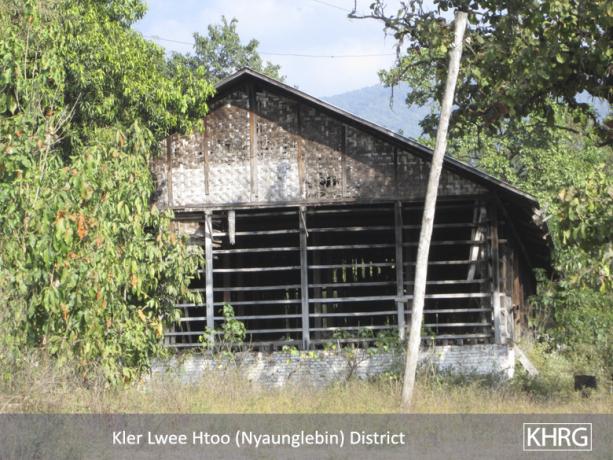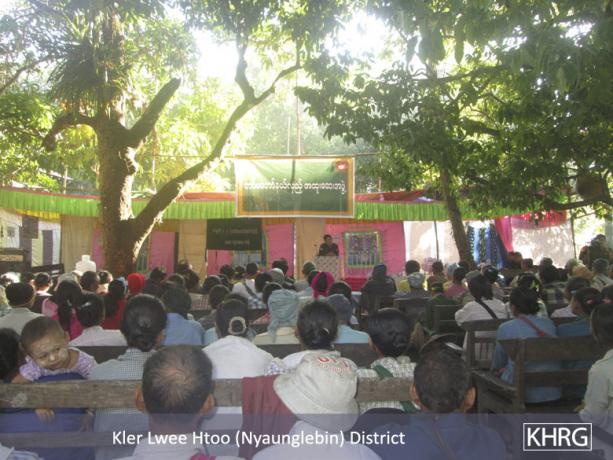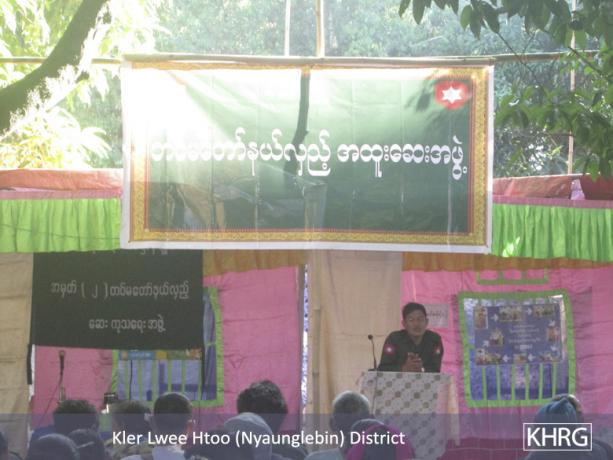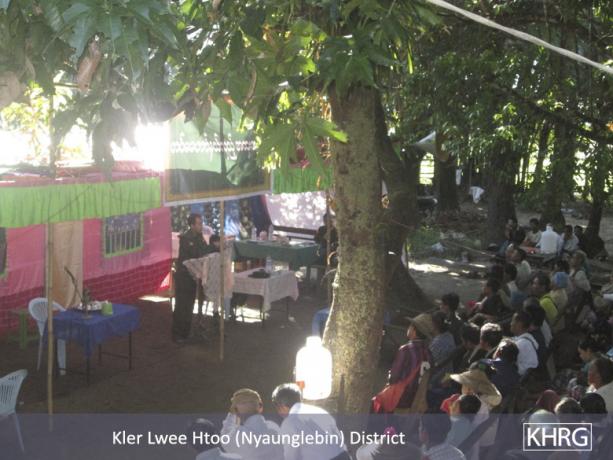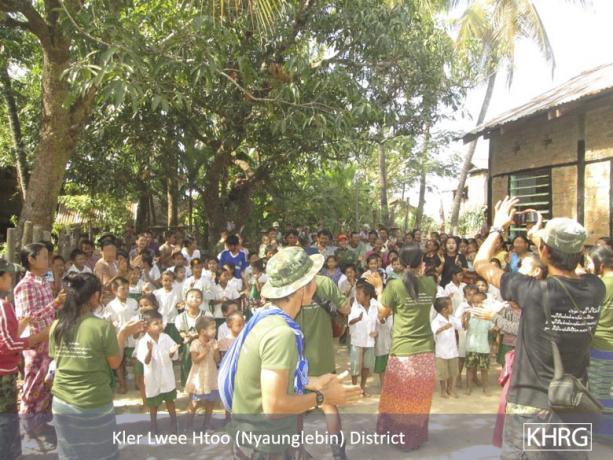This report includes a situation update submitted to KHRG in January 2013 by a community member describing events occurring in Nyaunglebin District during the period between November 2012 and January 2013. Specifically, it describes the confiscation of more than 2375. 14 acres of villagers' land by Tatmadaw Infantry Battalion #60. One villager was required by Light Infantry Battalion #264 soldiers to collect 250,000 kyat per month from the villagers who operate gold ore processing machines. The community member also describes how, despite the January 2012 ceasefire being in effect, the Tatmadaw continues to increase resupply missions in the area, which has created alarm amongst local civilians. As part of a CIDKP pilot project, 173 sacks of rice have been distributed to Muh Theh villagers. The community member reports that there was an increase in medical care in the area, where Tatmadaw medics travelled with armed soldiers to three towns in KNU-controlled areas in Kyauk Kyi Township, while FBR medics travelled with unarmed KNLA soldiers to Tatmadaw-controlled areas. In response to the land confiscation, villagers' reported their complaints by submitting a letter to the Burma government, however, no response had been received as of January.
Situation Update | Kyauk Kyi Township, Nyaunglebin District (November 2012 to January 2013)
The following situation update was written by a community member in Nyaunglebin District who has been trained by KHRG to monitor human rights conditions. It is presented below translated exactly as originally written, save for minor edits for clarity and security.[1] This report was received along with other information from Nyaunglebin District, four interviews, one other situation update and 233 photographs.[2]
Introduction
There are still the human rights abuses that are happening in our area. The human rights abuses are:
(1) Land confiscation
(2) Demanding money
(3) The Tatmadaw ration transportation
(4) Burning of Nant Thar Kwin Market
(5) CIDKP [Committee for Internally Displaced Karen People] provide rice to Muh Theh villagers[3]
(6) The Tatmadaw examined patients in a village
(1) Land confiscation
Starting in 1996, the Internal Ministry Department confiscated flat fields and rubber plantations that amounted to 2,375.14 acres. [Tatmadaw] Light Infantry Battalion #351 confiscated 1,790.62 acres, and Infantry Battalion #60 confiscated 566.52 acres of land, and built their army camps. According to their commanders' orders, they confiscated 26 flat fields from 26 owners. Infantry Battalion #60 also confiscated 189.20 acres of flat fields and 96 acres of plantations from 18 owners in 2006.
In addition [to those confiscations], the government armed groups [Tatmadaw] confiscated 2,357.14 acres of lands according to the orders from their leaders. Again, according to the orders from their leaders, they confiscated 266 acres of flat fields from 32 owners. The land that was confiscated by the Tatmadaw is 2,719.91 acres in total, which includes 455.97 acres of flat fields owned by 58 people, and it also includes 96 acres of cashew plantations, and there are 18 owners for those. Regarding the land confiscation, when the villagers go back and do flat field farming in one acre of their land that was confiscated, they will have to give [the Tatmadaw] 15 baskets[4] of rice (480 kg./1,056 lb.), [which is the harvest from] one acre of cashew plantation and 6,000 kyat(US$ 7.01)[5] every year. Some of the flat field farmers could not afford to give, so they were forced [to pay] and threatened. Later, they left their land and other people beganworking on their farm.
Regarding this land confiscation, the villagers submitted a letter to the Government. The villagers submitted it in April 2012, and until now there has been no response yet. Some villagers already know that, for their land that was confiscated [previously], they will get it [replacement land] from the 32 flat fields owners who [recently lost] 266.77 acres in total. They knew that they would get replacement flat fields because the KyaukKyi Township Administrator said that he will arrange something for the villagers. They did not get back any other things except for the flat field.
In 1956, the Government provided the [46.20] acres lands for the Christian religion. In 1980 the Government came and stayed at the church, and then built their army camp there. Whatever the Government's [people] were doing, the villagers dared not to complain. But now, the villagers reported it and [requested] that they [Tatmadaw] remove [their camp] from the church area. Currently, even though the villagers reported it to them [government authorities], they have not moved yet.
(2) Demanding money
During December 2012, Shwegyin Operation Commander and Light Infantry Battalion (LIB) #264 soldiers demanded 250,000 kyat (US$292.06) per month for [operating] a gold sluice. For them [the Shwegyin Operation Commander and LIB #264] to collect the money, they ordered a villager from M--- to collect [the tax] for the gold machines; there are more than 40 gold [ore processing] machines. The villager who was ordered to collect the money is S---, and he has collected the money.
(3) [Tatmadaw] Ration transportation
On December 21st, the Tatmadaw started to transport their rations[6] to the jungle where their army camps are located. They started the transport in Than Bon to Muh Theh, then to Kler Soh, and lastly to Paw Khay Hkoh area, where their army camps are located. They transported their rations with 40 cars, and the villagers are worried because the Tatmadaw continues sending their rations. In the past, because there was fighting, if the Tatmadaw sent their rations, the Karen National Liberation Army [KNLA] awaited them on the way and shot at them. But now, there is no disruption and they sent their ration smoothly, so the villagers are really worried.
(4) Burning of Nant Thar Kwin [Market]
On December 10th 2012, 29 stalls in Nant Thar Kwin Market and 15 rooms in Byar Kya Market were burnt. The markets were built in 2004 and the people who constructed the markets are [current] Kyauk Kyi Township Solidarity [Union Solidarity and Development Party (USDP)][7] Chairman U Thein Soe and Nant Thar Kwin [Market] Chairman U Mya Maung. They rent it to the villagers and told them that they will make it Si Pin Zay [clean and developed] for them, which means it will be called Si Pin Zay. In the Si Pin Zay, they charge 100 kyat (US $0.12) per stall every day. The shop owners are not allowed to sleep in the shop, since it is a Si Pin Zay; the powerful people do not let the shop owners sleep in their shop. In December 10th 2012, at 7:45 am, the Si Pin Zay was burnt and the powerful people did not take any responsibility[8] for this. It again returned to be each of the owner's [vendor's] responsibility; it is not Si Pin Zay anymore. The shop owners realized that what the powerful people said was all lies. One of the shop owners, Daw P--- said that, "We thought that this market was a Si Pin Market, but after it was burnt, it is not a Si Pin Market anymore and it became fake."
(5) CIDKP pilot project for Muh Theh villagers
On December 21st 2012, the people in charge of the CIDKP (Committee of Internally Displaced Karen People) took care of a Pilot project,[9] and sent 173 rice sacks to the villagers in MuhTheh village, which has [censored for security] households and [censored for security] people, for one month. We do not know where the food comes from, but we only know that CIDKP helped the villagers.
(6) Tatmadaw made rounds to patients in the village
On November 22nd, 2012, the Government army [Tatmadaw from Southern Command Headquarters] provided three groups of travelling health workers to give treatment to patients in villages; they entered three places, which are Shwegyin town, Kyauk Kyi town and Leik Tho town. The [health workers] also brought some medicine and injections with them when they made rounds tothe patients. For the patients who needed operations, they would send them to the military hospital.
Even though they said, they have their own food and rations when they made rounds to the patients in the village, the villagers have to arrange for their transportation, like cars and motorbikes. They also said that they would pay for the food that they took, but as a result, it is just a welcoming [gift] with food for them since the villagers did not get anything back.
On December 5th, 2012, when they came to Lah Taw village tract to give treatment to the patients, the villagers had to go and wait for them with motorbikes, and sent them back. When the villagers sent them by car [after being treated], they did not even pay the petrol cost for the villagers. When they [medics] stayed in the village, the villagers prepared the food for them, and it cost more than 300,000 kyat (US $350.47) in total. But when they were done with their work, on December 8th, 2012, before they left, they didn't pay back any money that the villagers used for them. Later, four village tracts, which are Weh Lah Taw, Noh Gaw, Pah T'Lah and Thoo K'Bee village tracts, gathered together and paid the cost. When they travelled around to give the treatment, Operation commander Colonel Myo Aung also came with them. When they came to see the patients, more than 60 soldiers came with them for their security.
(7) FBR made rounds to patients in the villages of Ler Doh (Kyauk Kyi) Township
On December 22nd 2012, FBR [Free Burma Rangers] entered Ler Doh Township areas, which are Pah T'Lah village tract and Thoo K'Bee village tract, and developed a relationship with the villagers and gave the treatment to patients. When they went to give the treatment, security also went with them, but the Burma government did not allow them to bring any weapons, so the workers did not bring any weapons with them. That area is the border area between KNLA controlled area and the Tatmadaw controlled area. They can cross each other's area, but the fact that the Tatmadaw does not allow the other to carry their weapons, shows that it will be hard for the two groups to build trust in each other. When the Tatmadaw crossed the [KNLA] area and brought weapons with them, the KNLA did not say anything. But when the KNLA wanted to bring weapons with them, the Tatmadaw did not allow them,so in the future, the possibility that the ceasefire will be broken is increasing.[10]
(8) General information
The Tatmadaw always transports their rations and they also continue rotating. On December 31st 2012, Infantry Battalion (IB) #92 came to the IB #60 army camp to rotate. In the field, their soldiers are still travelling around the areas.
On January 12th 2013, the villagers from Nyaunglebin celebrated Karen New Year wonderfully; six Tatmadaw leaders and five senators came. On January 11th 2013, the sponsor from Norway and people in charge from CIDKP and KORD [Karen Office of Relief and Development] held a meeting and decided to work with non-governmental organizations inside and outside other communities. Our situation report is about the incidents that really happened in our area.
These photos were taken by a community member on January 11th 2013 in Kyauk Kyi Township, Nyaunglebin District. The first photo shows a Tatmadaw army camp that was built in 1980 on land where a village church had been. The abandoned frame of the church that was confiscated by the Tatmadaw in 1980, is shown in the second photo. In 2013, the Tatmadaw began improving their camp. The third photo shows some of the 96 acres of land that was confiscated by IB #60 and the last photo shows 455.97 acres of land that is owned by 58 villagers. [Photos: KHRG]
These photos were taken on January 5th 2013 in Hsaw Htee Township, Nyaunglebin District and show gold miners who have been allowed to mine ore using a process known as cyanidation. This process involves placing crushed ore into piles where a cyanide solution is poured over it to dissolve the gold and allow it to “leach” out of the pile and also into the ground. This process risks contaminating the surrounding area and is heavily regulated by many nations. [Photos: KHRG]
These photos were taken on December 12th 2012 in Kyauk Kyi Township, Nyaunglebin District. In both photos one Tatmadaw truck can be seen that had delivered rations to a military area on the top of a nearby hill. The community member who took these photos reported that 40 trucks sent food from Tha Bon to Paw Khay Hkoh, in Muh Theh area. [Photos: KHRG]
These photos were taken on December 12th 2012 in Kyauk Kyi township, Nyaunglebin District. They show the extent of the damage to Nant Thar Kwin Market from a fire that burned on December 10th 2012. According to the community member who took these photos, 29 large shops and 15 smaller shops burned down, but did not report any injuries related to the fire. The community member did report that the owners of the market, USDP Chairman U Thein Soe and Chairman U Mya Maung, initially planned to develop the markets to make it clean and sanitary, but later abandoned this plan after the fire.
These photos were taken on December 6th 2012 in Weh Lah Htaw village, Kyauk Kyi Township, Nyaunglebin District. They show Tatmadaw medics and soldiers who visited villages in the local area to provide medical treatment for patients. At this moment, Tatmadaw General Officer Myo Aung was addressing Weh Lah Htaw villagers.
These photos were taken on December 22nd 2012 in Kyauk Kyi Township, Nyaunglebin District. They show Free Burma Rangers health workers who traveled to local areas and provided treatment to patients in Thoo K’Bee village tract and Pa Ta La village tracts. [Photos: KHRG]
Footnotes:
[1]KHRG trains community members in eastern Burma to document individual human rights abuses using a standardised reporting format; conduct interviews with other villagers; and write general updates on the situation in areas with which they are familiar. When writing situation updates, community members are encouraged to summarise recent events, raise issues that they consider to be important, and present their opinions or perspective on abuse and other local dynamics in their area.
[2] In order to increase the transparency of KHRG methodology and more directly communicate the experiences and perspectives of villagers in eastern Burma, KHRG aims to make all field information received available on the KHRG website once it has been processed and translated, subject only to security considerations. As companion to this, a redesigned website will be released in 2012. In the meantime, KHRG's most recently-published field information from Nyauglebin District can be found in the report, "Nyaunglebin Situation Update: Kyauk Kyi Township, May to July 2012," KHRG, March 2013.
[3] While the donation of rice by CIDKP is included within this list of 'human rights abuses', it is likely that the community member does not consider it to be a human rights abuse, and only included it within this list because it is described in the report below.
[4] A 'Basket' is a unit of volume used to measure paddy, milled rice and seeds. One basket is equivalent to 20.9 kg. or 46.08 lb. of paddy, and 32 kg. or 70.4 lb. of milled rice. A basket is twice the volume of a big tin.
[5] As of February 15th 2013, all conversion estimates for the kyat in this report are based on the official market rate of 856 kyat to the US $1. This reflects new measures taken by Burma's central bank on April 2nd 2012 to initiate a managed float of the kyat, thus replacing the previous fixed rate of 6.5 kyat to US $1.
[6] For more information on Tatmadaw resupply and troop deployment since the January 2012 ceasefire, see these KHRG reports: "Toungoo Situation Update: Daw Hpa Hkoh Township, September to December 2012," KHRG, February 2013; "Torture and killing in Thaton District," KHRG, October 2012; "Tatmadaw soldiers fire at four villagers carrying rice, order forced labour in Toungoo District," KHRG, July 2012; and "Sustained Tatmadaw resupply operations in Thaton, Nyaunglebin and Papun during ceasefire," KHRG, May 2012.
[7] The USDP was founded in advance of the November 2010 elections and is the party of current President of the Union, Thein Sein.
[8] The tone used by the community member in the original untranslated report implied that the owners of the markets were attempting to avoid following through with their original plans to renovate and clean the markets.
[9] After the 2012 ceasefire between the Union government and the KNU, a Norwegian initiative called the Myanmar Peace and Support Initiative (MPSI) was formed by the Norwegian government to support the peace process throughout the Union. In May 2012, MPSI representatives visited LerDoh Township, in Nyaunglebin District and met with community members. For more information on the MPSI and other pilot programs in Nyaunglebin, see these KHRG reports: "Nyaunglebin Situation Update: Moo, LerDoh and Hsaw Htee townships, January to June 2012," KHRG, October 2012; and "Nyaunglebin Situation Update: Kyauk Kyi Township, July 2012," KHRG, September 2012.
[10] For the KHRG ceasefire commentary, see "Steps towards peace: Local participation in the Karen ceasefire process," KHRG, November 2012.


